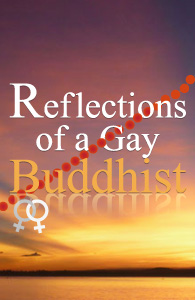
Over the six months of contributing to Fridae.com, there has been several occasions where I have been asked what Dharma is, so I think it is time I should address this.
Dharma is a Sanskrit term which means correct conduct or virtuous path. In Buddhism, it refers to Buddha’s teachings. However, Buddha’s teachings are so vast that it’s difficult for most novices or spiritual seekers to comprehend the scope of what Dharma is.
I find that the renowned Tibetan Master, H.E. Tsem Tulku Rinpoche, conveys the broad meaning of Dharma best in laymen’s terms, he says: Dharma is not about who’s right and who’s wrong, it’s not about whose [spiritual] centre is big, it’s not about which religion is right, it’s not about whether there’s a future life or a next life or not, it’s not about whether Buddha exists or God exists, it’s not about whether Catholicism is the real religion or Buddhism is the real religion: it’s not about any of that. It’s about us bringing harmony into our families, into our lives, into the people we care about NOW. That’s what it’s about. And that’s what we learn Dharma for.
Dharma is about love, harmony and the greater understanding that a couple (gay, straight or in-between) feels towards each other. Fewer arguments among individuals can only bring people to be closer among each other.
How does it bring people closer together? Not by magic, but by giving them Dharma - it opens up their minds to make them understand and look at things on a broader spectrum. And that’s what Dharma’s about.
What is the purpose of learning the Dharma? It is for all of us to have beautiful, harmonious relationships with people around us, to forgive the wrongs that they have done, that we have done; and to forgive ourselves also. Then we can move on to being happy, light, carefree individuals who can bring light to others.
That’s what Dharma is; if you have one less argument with your partner, that’s Dharma. If you have one less attachment, that’s Dharma. If you control your anger once a day, that’s Dharma. If you forgive your partner, that’s Dharma. All of these are what Dharma is: Dharma is about bringing people together.
Rinpoche says, don’t ever think, “I have a limit. I will give this much time, I will give this effort, I will give this much knowledge, I will give this much money, I will give this much donation.” No. Never put a limit. We all don’t have a limit to how much we want in life. We don’t have a limit on how successful we can be in life. So if you don’t have a limit to how much you want in life, how can you put a limit to how much you want to give to make yourself successful in life?
For instance, if we’re having an argument with our partner, we should stop thinking, “Why is my partner like that?” Maybe we should think, “Why do I react to my partner like that?” and change ourselves. Because you know what? Our partners are not going be Buddhas overnight. So we should stop asking, “Why is my partner still like that?” Instead, we should ask, “Why do I still react to my partner like that?” and let go.
Of course Dharma teachings make absolute practical sense – after all, Buddhism is based on logical thoughts and common sense. It has to be noted that often common sense can be presented as the least logical choice of thing to do. Dharma actually goes beyond common sense as it is a structured ‘path’ to Enlightenment, and on the way there, Dharma has been proven throughout the centuries to bring us out of dissatisfaction and unhappiness.
Personally, I do find Dharma to be as useful as a compass while I stumble through this harrowing labyrinth of life. Relationships with friends, lovers and family go up and down – as Tina Turner famously sang, “What is love but a second hand emotion, who needs a heart when a heart can be broken”. On a personal level, I can confidently say that without Dharma, I would have broken up with my girlfriend many times over (and she’d probably have killed me by now!).
However, sharing the same spiritual journey and following Dharma’s advice on how to be better human beings reminds us to let go of and transform our perceptions and illogical presumptions. This helps us overcome over mountains of self-made obstacles and move on to deeper and more fulfilling levels. That’s what Dharma is to me – it is a guide to be a happier person who strives to make others happier. Even though we won’t be Buddhas overnight either, at least we’re going in the right direction.
The above article contains edited extracts from ‘Peace’ and ‘If Not Now When’ by Tsem Tulku Rinpoche, 2009.
